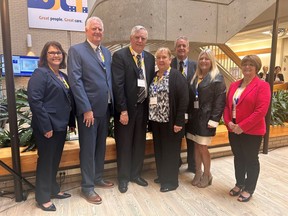The generosity of a late Delhi businessman and his widow were saluted Monday as the London Regional Cancer Program was renamed.

Equipped with a record donation, London’s cancer treatment center turned a new page Monday with a new name honoring a late Southwestern Ontario entrepreneur who left $20 million to fight the disease that took a terrible toll on his family.
Advertisement 2
Article content
Archie Verspeeten’s son said he hopes that legacy, among the $27 million that his late father and mother donated to London Health Sciences Center (LHSC) over the years, will one day mean that the London Regional Cancer Program – now renamed the Verspeeten Family Cancer Center – will never have to treat another patient.
Article content
“I hope they find a cure for cancer,” Dennis Verspeeten said, as the program’s new name was unveiled.
“That was my dad’s dream. He was so devastated losing two sons. He wanted to go before another one of his sons died because of cancer,” he said.
Archie Verspeeten, a Delhi resident who built a regional trucking empire from scratch through Ingersoll-based Verspeeten Cartage, made headlines days after his death last fall when the historic gift he left to the cancer center was announced. Both his widow Irene and sons Ron and Alan died of cancer.
Advertisement 3
Article content
“Dad understood this donation wouldn’t single-handedly eradicate cancer, but he believed it could win a couple battles and maybe contribute to the larger war,” Dennis Verspeeten said. “His greatest wish was for no other family to have to endure the loss we have experienced because of this disease.”
The record donation will transform the center into “a beacon of innovation and excellence in cancer treatment and research,” the London Health Sciences Foundation, the fundraising arm of LHSC, said Monday as officials broadly detailed how the money will be used.
“Today marks the beginning of the total reimagining of the London Regional Cancer Program,” said John MacFarlane, the foundation’s president and chief executive. “The Verspeeten Family Cancer Center will ensure we continue pushing the boundaries of cancer care at London Health Sciences Centre, setting new standards for others to follow. This is only made possible by the generosity of selfless donors, like Archie and Irene.”
Advertisement 4
Article content
Half the money will be used to improve patient care at the center, which serves a large swath of Southwestern Ontario, and to fund cancer research and fellowships for oncology specialists at the center, whose origins date back to the earliest days of modern cancer care in Ontario.
On the research side, $5 million will be used to establish the
Verspeeten Chair in Translational Cancer Research and $3 million to enhance the Verspeeten Clinical Genome Center. Another $2 million will be used to fund fellowships.
“The chair position allows recruits to provide salary support to research and help envision what cancer research will look like. The fellowship training offers a subspecialty type of training that allows training for an extra decade,” said MacFarlane.
Advertisement 5
Article content
The Verspeeten donation is “pivotal” to cancer research and treatment, said Dr. Michael Ott, LHSC’s head of oncology.
“This allows us to do more than what we have available,” he said. “We’re already finding treatments that are highly selective (for cancer), and people are living longer, and being cured of their cancer will make that possible for more people, with enough effort and time.”
The donation will also contribute to finishing the work at the genome center that examines gene expressions in tumors to create specific therapies for specific tumors, which was part of Archie’s original gift to the program, said Ott.
Kevin Chan, acting president and chief executive of LHSC, said Archie and Irene Verspeeten’s “visonary donation” enables “us to continue our work to improve patient outcomes by advancing excellence in cancer care, teaching and research.”
When he saw the center’s new name Monday, Dennis Verspeeten said he was buoyed but that his father would have shied away from the publicity.
“When you’re driving in, it makes you feel so happy (to see it),” he said.
“My dad would be proud, but he wouldn’t have been here. He was embarrassed by people thinking how much money he had. He just wanted to help people.”
Recommended from Editorial
Article content


